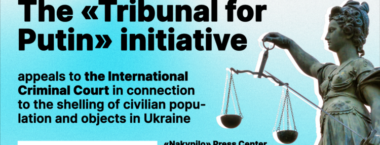To the Chairman of the Verkhovna Rada of Ukraine Mr. Andrii Parubii
To the Members of Parliament of Ukraine
Pacta sunt servanda
Dear Mr. Andrii Parubii!
Dear Members of Parliament of Ukraine!
Despite the complexity of the political situation in Ukraine, we, as a human rights community, have to note the fact of the dangerous attack on the rights and freedoms in the field of fighting corruption, both in the legislative sphere, by many representatives elected by people and government officials, and in the field of law enforcement, that is, by law enforcement agencies.
It is very dangerous to destroy and damage the new Criminal Procedure Code of Ukraine, adopted in 2012, which was assessed by international institutions as exemplary. Under the current CPC, detention is an exceptional precautionary measure. In the case when it is not a serious offense committed violently, the Code provides alternative preventive measures to be applied to a suspect.
In recent years, a number of governmental and parliamentary initiatives have been put forward to amend the legislation and prohibit judges from bailing suspects in accordance with a number of articles of the Criminal Code in order to combat corruption in Ukraine. Seven draft laws regarding this matter were registered in the Verkhovna Rada – Nos. 1838, 1871, 2086, 2284, 2330, 2654, and 3066 – although some of them have already been revoked. But there is new, extremely dangerous for rights and freedoms draft law no. 6519 to amend the Criminal Procedure Code of Ukraine (to ensure the inevitability of punishment of persons who committed corrupt crimes).
On this occasion, we must once again emphasize that the prohibition of bailing for persons who did not commit serious violent crime is in direct contravention of Article 5 §3 of the European Convention for the Protection of Human Rights and Fundamental Freedoms of 1950, as well as the case-law of the European Court of Human Rights (ECHR) that is mandatory to be considered and applied in Ukraine, which, in particular, in the case of Ilijkov v. Bulgaria, has established that the system of compulsory detention is incompatible with Article 5 § 3 of the European Convention by definition. Thus, even if the law formally allows detaining a person, the state must still convincingly prove the existence of those specific circumstances that prevail legitimate arguments in favour of preserving respect for the individual’s freedom, which became the object of official suspicion.
The compulsory detention also partly contradicts Article 29 of the Constitution of Ukraine, which states that this preventive measure may be applied temporarily without a court decision only “in the case of urgent need to prevent or stop a crime”.
Therefore, the latest legislative initiatives in this area are incompatible with the European choice of Ukraine. They will undoubtedly hurt the international image of our country and will also lead to a number of applications to the European Court of Human Rights, which Ukraine will not win by presumption. Taxpayers will have to pay for negligent and irresponsible actions of the authorities again.
A number of recent actions by anti-corruption law enforcement agencies, known to us from open sources of information, openly violate the fundamental principle of the rule of law, the Constitution and the international obligations of Ukraine.
In particular, it is generally accepted that the evidence obtained through deliberate provocation further violates the right of a person to a fair trial (Article 6 of the European Convention), as evidenced by the case-law of the European Court of Human Rights (see: Teixeira de Castro v. Portugal, Vanyan V. Russia, etc.). A similar approach is applied by the European Court of Human Rights in cases concerning deliberate provocation (by law enforcement officers) of an official to receive a bribe (see: Ramanauskas v. Lithuania, etc.). It is no coincidence that the principle of justice in the trial does not allow the prosecutor to sue a person who has accepted the offer to commit one or another criminal act, made by an undercover policeman.
Brutal violations of Art. 30, 31, 32 of the Constitution of Ukraine are also unauthorized by the court search and listening of telephones of persons, in particular, of MPs. Such acts constitute a clear violation of the requirements of Art. 8 of the European Convention and case-law of ECHR (see: Klass and others v. Germany, Bykov v. Russia, etc.).
All this leads to a disappointing conclusion that the struggle against systemic corruption in Ukraine, using selective repressive measures looks like frank and primitive populism. After all, the creation and maintenance of reliable legal guarantees of the real market in Ukraine, the gradual overcoming of corruption by other systemic methods is possible only under the conditions of fair justice, through the use of mechanisms of transparent management, consistent deregulation, general liberalization of economic relations in industry and agriculture.
It is obvious that the way of integration of Ukraine into the EU involves real and genuine respect for human rights, diligent adherence to the rule of law by the Ukrainian state. It also means that MPs must abandon populist legislative initiatives that violate human rights and freedoms.
It also forces us not to agree with the deprivation of parliamentary immunity of MPs, against whom there were frankly provocative, illegal actions by domestic law-enforcement agencies.
We call on all authorities in Ukraine to abandon the initiatives aimed at abolishing alternative preventive measures promptly, since this problem is artificially foolish, populist and harmful, not to mention that the proposed ways of its solution violate not only the Constitution of Ukraine but also the international law that is in force in Ukraine.
We urge MPs and government officials to comply with Ukraine’s international obligations in the field of observance and protection of human rights and freedoms and to abandon the legislative initiatives that violate them.
Arkadiy Buschenko, Executive Director of the Ukrainian Helsinki Human Rights Union
Yevhen Zakharov, Director of the Kharkiv Human Rights Protection Group



